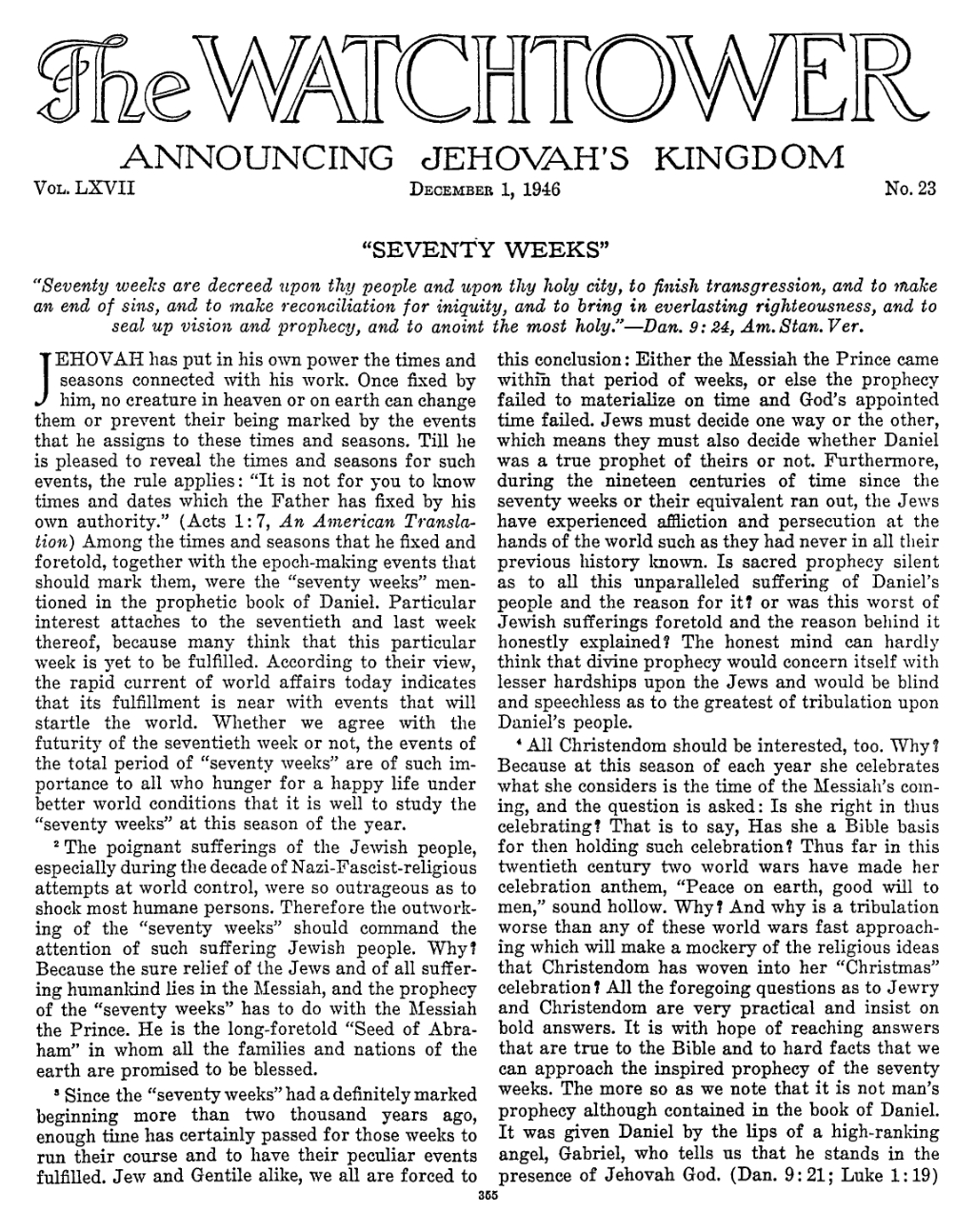This page has not been proofread
VOL.LXVII
DECEMBER 1, 1946
NO.23
"SEVENTY WEEKS"
"Seventy weeks are decreed upon thy people and upon thy holy city, to finish transgression, and to make an end of sins, and to make reconciliation for iniquity, and to bring in everlasting righteousness, and to seal up vision and prophecy, and to anoint the most holy."—Dan. 9:24, Am.Stan.Ver.
[Template fetch failed for https://data.jwunited.org/wiki/Template:wh-00?action=raw: HTTP 404]
1 JEHOVAH has put in his own power the times and seasons connected with his work. Once fixed by him, no creature in heaven or on earth can change them or prevent their being marked by the events that he assigns to these times and seasons. Till he is pleased to reveal the times and seasons for such events, the rule applies: "It is not for you to know times and dates which the Father has fixed by his own authority." (Acts 1:7, An American Translation) Among the times and seasons that he fixed and foretold, together with the epoch-making events that should mark them, were the "seventy weeks" mentioned in the prophetic book of Daniel. Particular interest attaches to the seventieth and last week thereof, because many think that this particular week is yet to be fulfilled. According to their view, the rapid current of world affairs today indicates that its fulfillment is near with events that will startle the world. Whether we agree with the futurity of the seventieth week or not, the events of the total period of "seventy weeks" are of such importance to all who hunger for a happy life under better world conditions that it is well to study the "seventy weeks" at this season of the year.
2 The poignant sufferings of the Jewish people, especially during the decade of Nazi-Fascist-religious attempts at world control, were so outrageous as to shock most humane persons. Therefore the outworking of the "seventy weeks" should command the attention of such suffering Jewish people. Why? Because the sure relief of the Jews and of all suffering humankind lies in the Messiah, and the prophecy of the "seventy weeks" has to do with the Messiah the Prince. He is the long-foretold "Seed of Abraham" in whom all the families and nations of the earth are promised to be blessed.
3 Since the "seventy weeks" had a definitely marked beginning more than two thousand years ago, enough time has certainly passed for those weeks to run their course and to have their peculiar events fulfilled. Jew and Gentile alike, we all are forced to this conclusion: Either the Messiah the Prince came within that period of weeks, or else the prophecy failed to materialize on time and God's appointed time failed. Jews must decide one way or the other, which means they must also decide whether Daniel was a true prophet of theirs or not. Furthermore, during the nineteen centuries of time since the seventy weeks or their equivalent ran out, the Jews have experienced affliction and persecution at the hands of the world such as they had never in all their previous history known. Is sacred prophecy silent as to all this unparalleled suffering of Daniel's people and the reason for it? or was this worst of Jewish sufferings foretold and the reason behind it honestly explained? The honest mind can hardly think that divine prophecy would concern itself with lesser hardships upon the Jews and would be blind and speechless as to the greatest of tribulation upon Daniel's people.
4 All Christendom should be interested, too. Why? Because at this season of each year she celebrates what she considers is the time of the Messiah's coming, and the question is asked: Is she right in thus celebrating? That is to say, Has she a Bible basis for then holding such celebration? Thus far in this twentieth century two world wars have made her celebration anthem, "Peace on earth, good will to men," sound hollow. Why? And why is a tribulation worse than any of these world wars fast approaching which will make a mockery of the religious ideas that Christendom has woven into her "Christmas" celebration? All the foregoing questions as to Jewry and Christendom are very practical and insist on bold answers. It is with hope of reaching answers that are true to the Bible and to hard facts that we can approach the inspired prophecy of the seventy weeks. The more so as we note that it is not man's prophecy although contained in the book of Daniel. It was given Daniel by the lips of a high-ranking angel, Gabriel, who tells us that he stands in the presence of Jehovah God. (Dan. 9:21; Luke 1:19)
